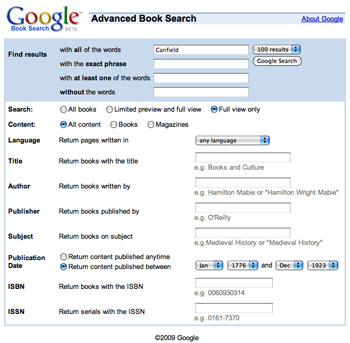A few days ago, I did a short review of the current state of the Book Search at HeritageQuestOnline. I was pleased to see about 4000 more titles there than there were just a couple years ago. I determined to a similar review today of Google Book Search. The following is what I came up with.
 Having cut deals with major libraries, and numerous publishers, Google has been scanning and digitizing books for several years now. What they set out to do was controversial, in that not everyone wanted their books scanned and made available online. However, they seem to have found a balance that’s allowed the program to go forward at a rate we wouldn’t have dreamed of a decade ago.
Having cut deals with major libraries, and numerous publishers, Google has been scanning and digitizing books for several years now. What they set out to do was controversial, in that not everyone wanted their books scanned and made available online. However, they seem to have found a balance that’s allowed the program to go forward at a rate we wouldn’t have dreamed of a decade ago.
Any book printed prior to 1923 is in the public domain, so Google can scan all that stuff and post it online with permission from no one. In other cases, Google doesn’t have permission to post entire pages, but they can make the books searchable and they have posted snippets of the work online, with bibliographical information and links to online book sellers. The snippet is often sufficient for the researcher to know if the data pertains to their subject of interest – and for the genealogist, it may, in itself, be just the clue that’s needed to continue the family research. We’ve found that the snippet often does not contain the actual words that were searched for, but material just above or below it. That can be frustrating. In other cases, Google may come back noting a hit in a particular book – and give bibliographical and bookseller information, but no snippet.
For the genealogist, the real value in Google Book Search is not in the in-copyright materials, but in the older out-of-copyright books that Google is scanning and putting online in full-text versions. As noted before, any book printed prior to 1923 is in the public domain and anyone can publish the materials – including Google.
The wealth of out-of-copyright materials available is growing continually. In the September of 2006, Dollarhide did a review of the Google Book Search for Everton’s Genealogical Helper. Using the Advanced Book Search; he typed the words “vital records” into the “with all words” portion of the book search. Then he limited the search to “Return books published within the years of” 1440 and 1923. He picked the limitation dates based on the idea that he was looking for out-of-copyright materials that would most likely be available in full-text on Google’s website. He got 61 hits, which he confirmed by checking each one. Most of the books were Massachusetts Vital Records in full-text view. I just did the same search, only limiting the dates to 1776 to 1923 (1776 now being the earliest date available to search). I got 213 hits. Note that the results numbers are quirky, and often state ridiculously high numbers, but upon clicking from screen to screen, you’ll find that the actual numbers of hits is much lower. Here again, I found that Massachusetts Vital Records make up much of what’s returned in the results. It’s just that there are a lot more books listed now than before. Not all of them are available in “full view.” Many are just “snippets,” while other just give the bibliographical information with “no preview available.”
I next typed the name “Meitzler” into the “With all of the words” search box, limited the date to 1923 and got an actual 288 hits (here again, the results number are quirky), whereas Dollarhide only got eight hits in 2006. The term “Canfield” returned about 35 hits for Dollarhide in 2006, a number of them found in local, county, and state histories, while I got 267 in my search today.
Keep in mind that the site is still in Beta, and it has its problems. However, all-in-all, the Google Book Search has come a long way in two and a half years. Note that there are more options for “advanced searches” now than there were before, one of them being that you can limit your search to books that actually have “full view” available. If you haven’t searched it lately, now would be a good time to do so.